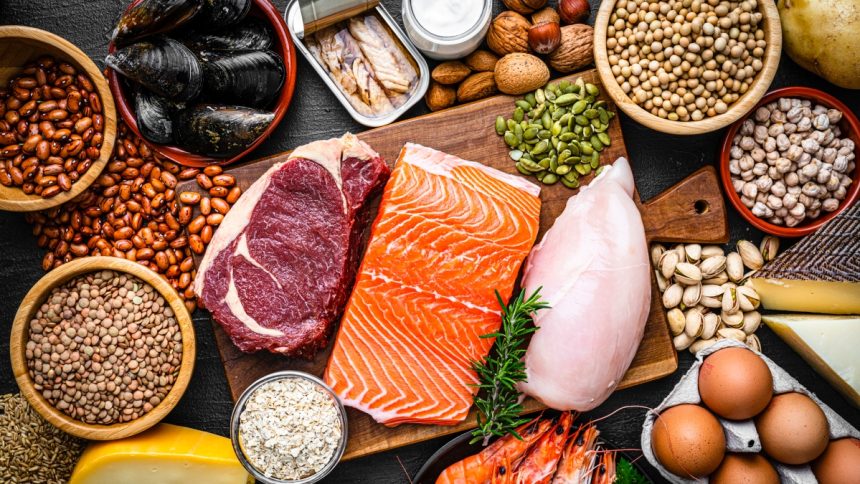Protein is often connected to building muscle and staying fit, but its role in your health goes far beyond that. From supporting your skin to keeping you feeling full throughout the day, this essential nutrient is crucial for your overall well-being. If you’ve been wondering how more protein can benefit you, it’s time to look beyond the basics. Protein impacts many different aspects of health, some of which may surprise you. So, what can adding more protein do for your health? Let’s explore six important ways it can make a difference in your life.
Protein Gives You Glowing Skin
When it comes to skincare, protein might not be the first thing that comes to mind. However, it’s an essential building block for maintaining healthy, radiant skin. Protein helps with the production of collagen, a structural protein that keeps your skin firm, smooth, and elastic. Without enough protein, your skin can lose its vibrancy and start to show signs of aging, such as wrinkles and sagging.
Eating a protein-rich diet supports your body’s ability to better repair and regenerate skin cells, keeping your complexion looking fresh and youthful. Getting the right amount of protein can contribute to glowing skin by boosting collagen production and keeping your skin hydrated and strong.
If you’re aiming for that healthy, glowing skin look, make sure protein is a regular part of your diet. It’s not just about using the right skincare products—what you put into your body can have just as big of an impact on how your skin looks and feels. Whether it’s through lean meats, plant-based sources, or supplements, upping your protein intake could be the secret to maintaining that radiant glow.
Feeling Full Longer: How Protein Curbs Hunger
One of the most helpful benefits of protein is its ability to keep you feeling full for longer periods. Unlike carbohydrates or fats, protein takes longer to digest, which helps regulate your appetite and prevent overeating. This makes it very useful for weight management and overall health. If you are constantly hungry or you crave unhealthy snacks throughout the day, you might not be getting enough protein in your diet.
Including protein-rich foods in your meals can even reduce the temptation for you to reach for sugary or high-calorie snacks. If you’re looking for a convenient way to increase your protein intake, consider adding a shake made with vanilla, chocolate, or strawberry protein powder to your routine. Protein powders like these can be a tasty and effective way to keep hunger at bay while also supporting your overall health.
This feeling of fullness isn’t just about keeping your appetite under control—it can also help with weight loss and prevent overeating, especially in those moments when stress or boredom might make you reach for unhealthy snacks. By integrating more protein into your meals, you can stabilize your energy levels and feel more satisfied, helping you make healthier choices throughout the day.
Supporting Bone Health as You Age
When people think about maintaining healthy bones, calcium is often the first nutrient that comes to mind. However, protein also plays a big part in supporting bone density and strength, especially as you age. Studies have shown that a diet rich in protein can help preserve bone mass, which becomes increasingly important in preventing fractures and osteoporosis as you grow older.
Protein works alongside calcium and vitamin D to help your body maintain strong bones. While calcium strengthens bones, protein provides the structure and framework they need to stay intact. In fact, eating more protein can increase the absorption of calcium in your diet, making it more effective at keeping your bones strong. As we age, the natural loss of muscle and bone density can lead to increased fragility, but a higher protein intake can help counteract this.
Speeding Up Recovery After Injury or Surgery
Protein is often referred to as the body’s repair nutrient, and for good reason. When you’re recovering from an injury, surgery, or illness, your body needs extra protein to repair tissues, heal wounds, and rebuild damaged cells. Without enough protein, your recovery process may be slower, leaving you feeling fatigued or weak for longer than necessary.
During times of healing, your body’s demand for protein increases. This is because protein helps to generate new cells, rebuild tissues, and strengthen your immune response—all of which are crucial for a speedy recovery. Whether you’re recovering from a workout-related injury or a more significant medical procedure, increasing your protein intake can help you bounce back faster and with better results.
Lynn Martelli is an editor at Readability. She received her MFA in Creative Writing from Antioch University and has worked as an editor for over 10 years. Lynn has edited a wide variety of books, including fiction, non-fiction, memoirs, and more. In her free time, Lynn enjoys reading, writing, and spending time with her family and friends.















